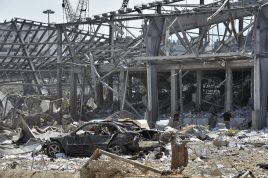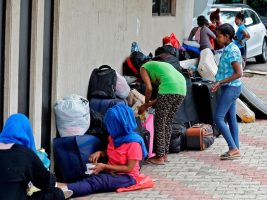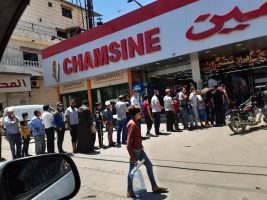“Next July 1st I will meet with the principal leaders of the Christian Communities present in Lebanon, for a day of reflection on the worrying situation in the country and to pray together for the gift of peace and stability.”
 Father Michel Abboud, president of Caritas Lebanon, quoted Pope Francis’ announcement at the Angelus of May 30, commenting to Sir on a “significant event that highlights, once again, the importance attached by the Pope to the fate of our country, whose future he hopes will be stable and peaceful.” “Before the County’s political chaos, amidst a severe economic crisis, it’s easy to feel abandoned and alone,” Father Abboud told SIR. However,
Father Michel Abboud, president of Caritas Lebanon, quoted Pope Francis’ announcement at the Angelus of May 30, commenting to Sir on a “significant event that highlights, once again, the importance attached by the Pope to the fate of our country, whose future he hopes will be stable and peaceful.” “Before the County’s political chaos, amidst a severe economic crisis, it’s easy to feel abandoned and alone,” Father Abboud told SIR. However,
once again the Pope is casting his fatherly gaze on our country.
His is a benevolent and thoughtful gaze that attests to the significance of the local Church as a point of reference for the whole of our country, and bestows further meaning on the religious dimension of our people.”
“This meeting,” he added, “must help us reflect on the resurrection of Lebanon where the Christian presence has a distinct identity, as stipulated by its denominational political framework. We must not abandon Lebanon at this difficult time for its inhabitants.”
Without a government for nine months. Exactly one year ago, Father Abboud entrusted SIR with a strong appeal for solidarity: “We struggle every day against poverty that is growing more dramatic by the day. We need food, medicines and clothing items.” The unprecedented economic and financial crisis, broke out well before the Covid-19 pandemic, and before the devastating explosion at the port of Beirut on August 4. Thereafter, the Land of the Cedars was rocked by protracted popular protests against the government, unable to find a solution to the crisis and tackle a debt burden equivalent to nearly 170% of its gross domestic product. Lebanon has been without a government since August 2020, after the resignation of outgoing Prime Minister Hassan Diab, in the wake of the deadly explosions that took place on 4 August in the port of Beirut.
 The crisis deteriorated dramatically a year later, as evidenced by EU High Representative Josep Borrell, who visited Lebanon on June 19 – 20, his first official visit on behalf of the EU: “The Lebanese leadership must assume its responsibilities and adopt the necessary measures without further delay,” Borrell said. “We cannot understand why, nine months after the designation of a Prime Minister, (Saad Hariri, ed.’s note) there is still no Government in Lebanon.” The UN and the World Bank estimate that well over half the population lives below the poverty line. The local currency, the lira, has depreciated by approximately 90% since autumn 2019, causing prices of consumer goods and essential services to skyrocket as Lebanon imports almost everything, even garlic and onions.
The crisis deteriorated dramatically a year later, as evidenced by EU High Representative Josep Borrell, who visited Lebanon on June 19 – 20, his first official visit on behalf of the EU: “The Lebanese leadership must assume its responsibilities and adopt the necessary measures without further delay,” Borrell said. “We cannot understand why, nine months after the designation of a Prime Minister, (Saad Hariri, ed.’s note) there is still no Government in Lebanon.” The UN and the World Bank estimate that well over half the population lives below the poverty line. The local currency, the lira, has depreciated by approximately 90% since autumn 2019, causing prices of consumer goods and essential services to skyrocket as Lebanon imports almost everything, even garlic and onions.
 “Never before had we suffered from hunger.” “Lebanon has been plagued by a chain of civil wars and unrest, resulting in widespread death and destruction since the early 1970s,” the Caritas president recalled.
“Never before had we suffered from hunger.” “Lebanon has been plagued by a chain of civil wars and unrest, resulting in widespread death and destruction since the early 1970s,” the Caritas president recalled.
But never before have the Lebanese suffered from hunger as they do today,
caught in the grips of an economic crisis and COVID-19. Those whose monthly salary amounted to $1,000 are now receiving no more than $100, which means they can hardly afford basic necessities such as food and medicine. Many hospitals in the country have ceased to function because of a lack of medical services, surgery and treatment. People who were wounded and diseased during past wars were always treated. Even schools are impacted by the crisis: many of them, 11 of which are run by the Church, were shut down this year and another 70 schools are at risk of closing. Teachers and doctors are unemployed. An estimated 1100 doctors and approximately 1000 teachers have emigrated abroad in the past three months alone. Others are planning to do the same. Most of them are Christians, and this exodus also jeopardises Lebanon’s Christian presence and identity.”
“This Christian exodus, was not wanted by the country’s Muslim community”, said Fr Abboud. “I am not saying this out of fanaticism: in Lebanon, Christians and Muslims have been living and working together throughout their existence. And we want to continue doing so. Without Christians, Lebanon would lose a part of its character, its existence would be undermined. Lebanon needs Christians”.
“Yesterday’s benefactors are today’s poor.” The Lebanese situation also extends to Caritas, which is struggling to meet people’s needs. “While in the past 10 people would come to our centres to ask for help,” the priest explained, “now we see an average of 50. Families who previously brought gifts and donations to Caritas now come to ask for assistance. In short,
the benefactors of the past are the poor of today.
We are trying to do everything we can, and it is thanks to the Lebanese diaspora that Lebanon is surviving today. They send money from abroad to support their relatives and friends. Without them, we would be facing a disaster. International agencies and NGOs are also actively supporting the Lebanese people as well as Syrian, Iraqi and Palestinian refugees. The solidarity projects that Caritas pursues are limited by the urgent needs of today: food, medicine, milk for children. This is our primary concern and commitment for the Lebanese people and for 1.5 million Syrian refugees, and others, who have been sheltering in Lebanon since 2011 and who are trying to survive as best they can amidst the ripples of the crisis. We must continue helping them and we are grateful to the many donors who are supporting us in this task.”
- Caritas Libano
- Caritas Libano
- Caritas Libano
- Foto Caritas Libano
- Foto Caritas Libano
Victims of political inaction. The political stalemate is preventing a solution to the Lebanese crisis. Father Abboud does not mince his words:
“the deadlock we been experiencing for over nine months is due to the selfishness of politicians who pursue partisan interests and particularism instead of working for the common good.”
“The Lebanese people are victims of this deadlock, victims of the selfishness of the political establishment. This is taking place with no intervention on the part of the international community. While Lebanon is close to the Pope’s heart, the same cannot be said of the international community,” reiterated the Caritas president, for whom “Cardinal Boutros Bechara Rai, the Maronite Patriarch, is rightfully calling for unity in the Country, encouraging the people to denounce the partisan interests of the political realm, nourishing the hope that the meeting of July 1 will contribute to the reaffirmation of Lebanon’s identity as a model of freedom, democracy and Muslim-Christian coexistence, with due respect for pluralism. Our people are tired of being humiliated.” “I am grateful to Pope Francis for not forgetting Lebanon, I am grateful to him for turning his gaze to our country,” concluded Father Abboud. “Holy Father, please help us to return to being a “message” for the entire Middle East, help us to continue believing in the miracle of salvation and of a future for all.”















